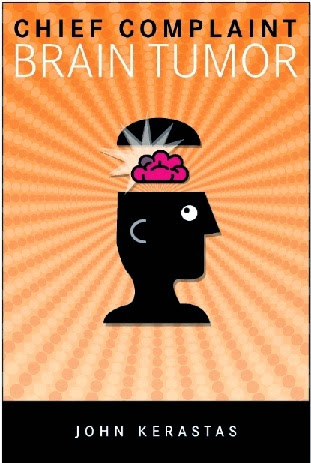Title: Chief
Complaint: Brain Tumor
Author: John Kerastas
Publisher: Sunstone Press
Genre: Memoir
Pages: 136
Author: John Kerastas
Publisher: Sunstone Press
Genre: Memoir
Pages: 136
Language:
English
ISBN-10: 0865349088
ISBN-13: 978-0865349087
At
57 years old, John Kerastas thought he was the poster child for fifty-year old
healthiness: he competed in triathlons, rode in 100 mile biking events and ate
a healthy diet chock full of organic vegetables. Then he discovered that he had
a brain tumor the size of his wife’s fist. His memoir chronicles the first year
he spent addressing tumor-related health issues: preparing for his first
operation, discovering a dangerous skull infection, having the infected portion
of his skull surgically removed, learning about his substantial vision and
cognitive losses, undergoing rehab and radiation treatments, and learning to
live with his “new normal.” According to Kerastas, the phrase “new normal” is
the medical community’s code words for “You’re alive, so quit complaining.” As
his health changed, so did his sense of humor. He writes that his humor started
out superficially light-hearted prior to the first operation; transmogrified
into gallows humor after several subsequent operations; and leveled out as
somewhat wry-ish after radiation and rehab. This is a surprisingly upbeat and
inspiring book for anybody interested in memoirs about people dealing with
personal crises, for patients trudging through rehab, for caretakers helping
victims of serious illnesses, or for anybody looking for an unexpected chuckle
from an unlikely subject. JOHN KERASTAS has worked at a global advertising
agency, at several technology start-up companies and as a free-lance writer.
Now, in addition to non-profit and charitable work, he spends his time
blogging, speaking and writing about brain health, brain tumors and rehab.
 JOHN KERASTAS has
worked at a global advertising agency, at several technology start-up companies
and as a free-lance writer. Now, in addition to non-profit work, he spends his
time blogging (www.johnstumor.blogspot.com), speaking and writing about brain
health, brain tumors and rehab.
JOHN KERASTAS has
worked at a global advertising agency, at several technology start-up companies
and as a free-lance writer. Now, in addition to non-profit work, he spends his
time blogging (www.johnstumor.blogspot.com), speaking and writing about brain
health, brain tumors and rehab.Why blogging is important
I
started blogging before I wrote my book; I blogged while writing my
book; and I’ve continued to blog after my book’s been published. Here’s
why:
1. To build my brand2. To keep current
3. To improve my writing
4. To test drive ideas
Brand Building
While
I think everybody now knows the importance of building a brand, I
believe an important key to brand-building is consistency. Consistency
is all about becoming known for a specific expertise/genre and
consistently writing in that genre. For example, Malcolm Gladwell seems
to have a knack for making behavioral science research appealing to the
masses. Laurence Gonzales is a whiz at exploring wilderness survivor
stories. John Grisham writes modern legal thrillers. When I buy one of
their books, because of the power and consistency of their brands, I
know what I’m going to get. Likewise, blogging help’s me continue to
strengthen my brand through a constant stream of postings about topics
supportive of my brand.
Keeping Current
I
write about brain health, brain tumors and rehab. It’s an arena that is
constantly changing and morphing with new medical protocols, new diets
and new brain-building exercises constantly being invented and
announced. If I didn’t make myself bang out 2 – 3 blog postings a week, I
could easily lose my tenuous grip on this fast-moving business.
Blogging forces me to read and write about new research, discoveries and
over-blown fads, i.e. while asparagus is very good for you, it won’t
cure brain cancer (in spite of the thousands of postings saying it
will/might/could/did for my relative).
Improving my writing
My most popular blog postings are both timely and pithy - http://www.johnstumor.
Test Driving New Ideas
Blogging
is a nifty environment for experimentation. It also gives surprisingly
quick feedback. I know when a topic – e.g. chia seeds and cancer –
resonate with my audience because website hits went through the roof
that same morning. Duds, like my blog posting entitled “How exercise
grows new brain cells”, never got out of the basement.
At
the same time, “who cares?” Unlike a book or magazine article, if a
blog posting stinks, doesn’t attract any readership or honks off
somebody, there’s always another posting tomorrow. But, if a book bombs, it’s the “elephant in the room” when talking to another publisher or editor.
And
while my blog is a great laboratory for testing story ideas, it’s also
an experimental environment for concocting different writing styles and
viewpoints. I once used my blog to write about a Dr. Frankenstein-like
day dream. It might be my personal favorite blog posting. As best I can
tell, though, my followers hated it, or worse, ignored it as almost
nobody read it.
Here’s two last
benefits about blogging: it’s cheap (many are free) and easy. And you
can build a blog site and be writing in minutes on sites like Google’s
Blogger (www.blogger.com) or WordPress - http://wordpress.com/. 










0 comments:
Post a Comment